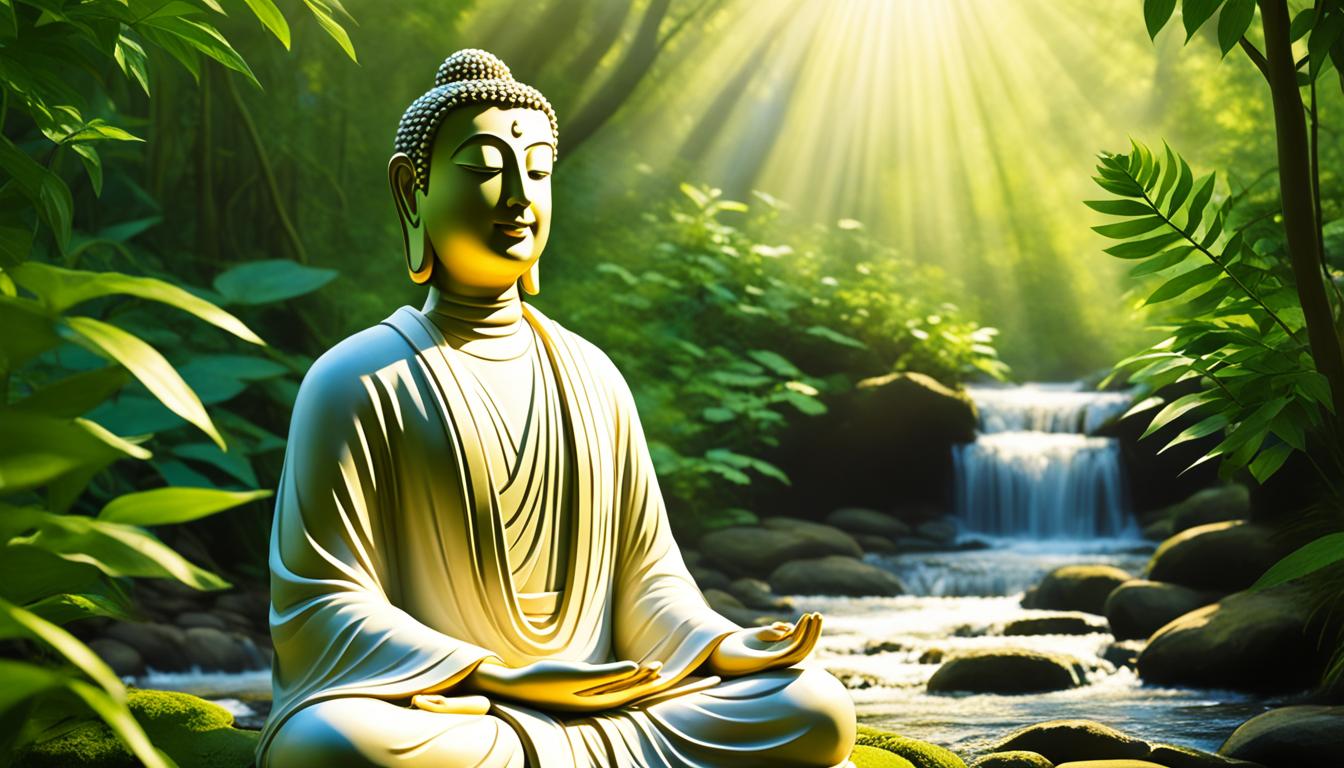Do you ever wonder about the nature of your self-identity? Is it truly fixed, or can it be dissolved for greater inner peace and personal growth? Explore the profound teachings of ego Buddhism and discover the transformative power of mindfulness practice and ego dissolution.
Key Takeaways:
- Ego Buddhism focuses on the practice of ego dissolution and letting go of attachment to self-identity.
- Mindfulness practice is a fundamental aspect of ego Buddhism, allowing individuals to observe their thoughts and emotions without judgment.
- Ego dissolution can lead to greater inner peace and personal growth, as it encourages a deeper understanding of the impermanence of self.
- Cultivating selflessness is another key aspect of ego Buddhism, fostering a sense of interconnectedness with others.
- By embracing ego Buddhism, you can embark on a path towards inner peace, personal growth, and the creation of a more compassionate society.
Buddhism’s Impact: Mindfulness and Compassion
Buddhism offers profound teachings on mindfulness and compassion, which have the power to revolutionize individuals and society. By embracing these principles, you can embark on a transformative journey of self-awareness and personal growth.
Mindfulness, a central practice in Buddhist philosophy, enables you to cultivate a deep awareness of your thoughts, emotions, and physical sensations. It empowers you to be fully present in the present moment, enhancing your ability to respond skillfully to life’s challenges. Through the practice of mindfulness, you develop a clearer understanding of your inner world, promoting self-awareness and self-reflection.
Compassion, another crucial aspect of Buddhist teachings, fosters a sense of interconnectedness and empathy. It encourages you to open your heart to the suffering of others and respond with kindness, understanding, and support. By cultivating compassion, you contribute to the creation of a more harmonious and compassionate society.

Embedded within Buddhist philosophy, mindfulness practice and compassion are intertwined. Through mindfulness, you develop the self-awareness necessary to cultivate compassion for yourself and others. This symbiotic relationship enhances your ability to understand and connect with the experiences and needs of others, deepening your capacity for empathy and genuine acts of kindness.
The integration of mindfulness and compassion in your life can lead to profound personal growth, inner peace, and a stronger sense of interconnectedness with the world around you. By embracing these principles, you embark on a transformative path of self-discovery, becoming more attuned to your inner wisdom and nurturing a compassionate heart.
Addressing Modern Challenges
Buddhism offers profound teachings and practices that address the modern challenges we face in our daily lives. By encouraging ego transcendence and selflessness, Buddhism provides a transformative path towards inner peace and a more harmonious society.
Ego transcendence is a central concept in Buddhism, which involves letting go of the ego’s attachment to self-identity and material possessions. When we transcend our ego, we free ourselves from the constant need for validation and external validation. Instead, we focus on cultivating inner qualities such as compassion, kindness, and understanding.
Through ego transcendence, we can experience a profound sense of inner peace. By letting go of our selfish desires and attachments, we create space for a greater sense of interconnectedness with others. This selflessness allows us to forge deeper and more meaningful connections, fostering a more compassionate and supportive society.
Imagine a world where people prioritize the well-being of others over personal gain, where acts of kindness and understanding become the norm. This is the vision that Buddhism aspires to achieve, and it starts with each individual’s commitment to ego transcendence and selflessness.
By embracing the practice of ego transcendence, we open ourselves up to a life of purpose and fulfillment. We become less concerned with our own ambitions and more focused on how we can contribute to the well-being of others. This shift in mindset brings about a deep sense of inner peace and contentment.
Through the practice of ego transcendence and selflessness, we can truly embody the spirit of Buddhism and create a positive impact on our lives and society as a whole. Now, let’s explore some practical ways to cultivate ego transcendence and experience inner peace in our day-to-day lives.

Practical Ways to Cultivate Ego Transcendence:
- Practice mindfulness meditation to develop awareness of your egoic thoughts and emotions.
- Cultivate gratitude and appreciation for the interconnectedness of all beings.
- Engage in acts of selflessness and random acts of kindness towards others.
- Let go of attachment to material possessions and embrace simplicity.
- Develop empathy by putting yourself in others’ shoes and seeking to understand their perspectives.
By incorporating these practices into your daily life, you can gradually transcend your ego and experience a profound sense of inner peace. Remember, ego transcendence is a journey, and it takes time and consistent effort. But the rewards are immeasurable, as you discover a deeper connection to yourself and others.
| Benefits of Ego Transcendence and Selflessness | Practices for Cultivating Ego Transcendence |
|---|---|
| Inner peace and contentment | Mindfulness meditation |
| Greater empathy and compassion towards others | Expressing gratitude |
| Stronger interpersonal relationships | Engaging in acts of kindness |
| A more harmonious and compassionate society | Letting go of attachment to material possessions |
The Practice of Ego Dissolution
Ego dissolution is a powerful practice in Buddhism that allows individuals to free themselves from the ego’s attachment to self-identity. By cultivating self-awareness and engaging in mindfulness practice, you can observe your egoic thoughts and emotions without judgment, gradually unraveling the grip the ego has on your perception of reality.
Through the lens of mindfulness, you become aware of the constant chatter of the mind, the incessant stream of thoughts that subtly shape your sense of self. As you observe these thoughts with non-judgmental awareness, you begin to see that the ego is not a fixed entity but a construct of the mind. It is merely a collection of ever-changing thoughts, beliefs, and identities.
This realization is liberating, as it allows you to disidentify from the ego, recognizing that it is not your true self. You start to understand that your essence is not defined by the ego’s limitations and attachments, but by a deeper, more expansive awareness beyond the confines of the self.
Practicing self-awareness and mindfulness also allows you to cultivate a spaciousness within your consciousness, creating room for the dissolution of the ego. With each moment of awareness, you weaken the ego’s influence over your thoughts and emotions. You become less reactive and more responsive, less identified with limiting beliefs and more attuned to the present moment.
The key to ego dissolution lies in developing a regular mindfulness practice. This can include meditation, body scan exercises, breath awareness, or mindful movement such as yoga or tai chi. Engaging in these practices allows you to observe the ego’s patterns and tendencies without judgment, gradually dissolving its hold on your perception of reality.
By embracing the practice of ego dissolution, you can experience a profound shift in your sense of self. As the ego loosens its grip, you awaken to a greater sense of interconnectedness with all beings and the world around you. You begin to cultivate a deepened compassion and empathy, leading to more harmonious relationships and a heightened understanding of the interconnected nature of existence.
The practice of ego dissolution is a transformative journey that leads to greater self-awareness, liberation from limiting identities, and a profound sense of inner peace. It is a path that invites you to let go of attachment to the ego and embrace the boundless potential of your true nature.

| Benefits of Ego Dissolution | Practices for Ego Dissolution |
|---|---|
|
|
Cultivating Inner Peace
Cultivating inner peace in Buddhism involves developing mindfulness practice and self-awareness. By being fully present in the moment and observing your thoughts and emotions with non-judgmental awareness, you can find a sense of inner calm and peace.
Mindfulness practice allows you to engage with each experience, sensation, and emotion without being consumed by them. It helps you develop a deeper understanding of the impermanence of life and the ever-changing nature of your thoughts and feelings. Through mindfulness, you can cultivate a sense of inner peace that is not reliant on external circumstances.
Self-awareness is an integral part of cultivating inner peace. By becoming more aware of your thoughts, beliefs, and patterns of behavior, you can gain insight into how they contribute to your inner turmoil. Self-awareness allows you to question and challenge negative thought patterns, paving the way for personal growth and inner transformation.
As you deepen your mindfulness practice and self-awareness, you begin to realize that your sense of self is not separate from the world around you. You develop a greater understanding of the interconnectedness of all beings and recognize that their well-being is intimately tied to your own. This realization fosters compassion and empathy, further enhancing your inner peace.
By embracing mindfulness and self-awareness, you embark on a profound journey of self-discovery and self-transformation. You cultivate the ability to find moments of peace and tranquility amidst the chaos of everyday life. Inner peace becomes a guiding force that allows you to navigate challenges with grace and wisdom.

| Benefits of Cultivating Inner Peace |
|---|
| 1. Reduced stress and anxiety |
| 2. Enhanced emotional well-being |
| 3. Improved focus and concentration |
| 4. Increased resilience in the face of challenges |
| 5. Enhanced relationships with others |
| 6. Greater clarity and insight |
Conclusion
Embracing ego Buddhism can lead to personal growth and inner peace. By practicing ego dissolution, mindfulness, and selflessness, you can develop a deeper understanding of yourself and your interconnectedness with others. This path of self-discovery and introspection can bring about transformative changes in your life.
Through the practice of ego dissolution, you can gradually let go of your attachment to self-identity and material possessions. This process allows you to experience a sense of inner peace that comes from transcending the ego and embracing selflessness. By shifting your focus from personal gain to a genuine concern for the well-being of others, you can cultivate compassion and contribute to the creation of a more harmonious and compassionate society.
Mindfulness practice plays a crucial role in ego Buddhism. By being fully present in the moment and observing your thoughts and emotions with non-judgmental awareness, you can cultivate self-awareness and gain insights into the impermanence of life. This awareness allows you to respond to challenges with clarity and compassion, enabling personal growth and fostering inner peace.
By embarking on the path of ego Buddhism, you are choosing a journey towards self-discovery, personal growth, and inner peace. Through ego dissolution, mindfulness practice, and selflessness, you can awaken to the interconnectedness of all beings and develop a deeper understanding of yourself. Embrace ego Buddhism and embark on the path to a more fulfilled, compassionate, and harmonious life.
FAQ
What is ego Buddhism?
Ego Buddhism refers to a practice in Buddhism that involves becoming aware of and transcending the ego’s attachment to self-identity. It emphasizes letting go of the ego’s attachment to material possessions and cultivating selflessness.
How does ego dissolution work in Buddhism?
Ego dissolution in Buddhism involves the practice of mindfulness and self-awareness. By observing egoic thoughts and emotions without judgment, individuals can gradually dissolve the ego’s grip on their perception of reality and experience inner peace.
How can mindfulness and compassion impact our lives?
Mindfulness and compassion are central teachings in Buddhism. Mindfulness helps individuals develop self-awareness and cope with conflicts, while compassion promotes interconnectedness and inspires acts of kindness and understanding.
What challenges does Buddhism address in modern society?
Buddhism addresses modern challenges by encouraging ego transcendence and selflessness. By letting go of the ego’s attachment to self-identity and material possessions, individuals can experience inner peace and contribute to a more harmonious and compassionate society.
How do we cultivate inner peace in Buddhism?
Cultivating inner peace in Buddhism involves developing mindfulness practice and self-awareness. By being fully present in the moment and observing thoughts and emotions with non-judgmental awareness, individuals can find a sense of inner calm and deeper connection with oneself and others.
How can embracing ego Buddhism lead to personal growth?
Embracing ego Buddhism allows individuals to delve deeper into understanding themselves and their interconnectedness with others. By practicing ego dissolution, mindfulness, and selflessness, individuals can experience transformative personal growth and contribute to a more harmonious and compassionate society.

